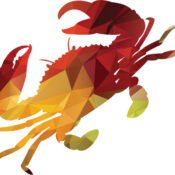Managing editor and logophile Andy Hollandbeck reveals the sometimes surprising roots of common English words and phrases. Remember: Etymology tells us where a word comes from, but not what it means today.
Anxiety over social isolation, lost wages, and the steady stream of frightening news means that many of us could use a laugh just to break the tension. So this week I’m giving you laugh quite literally — its history and derivation.
Laugh goes back to the Old English hliehhan, which may have been onomatopoeic — meaning the word itself mimics the sound of laughter. This became the Middle English laughen or laghen and eventually laugh.
In earlier times, the -gh in laugh was probably vocalized at the back of the throat, like the -ch in the Scottish word loch or, more to the point, in lachen, the German verb meaning “to laugh.” Over time, the pronunciation shifted from -ch to -f, but the original spelling remained.
It’s the same story we see for a lot of those weird -ugh words. Daughter, for example, has been pronounced in various places and at various times as DOCH-ter (with the same -ch in loch) and DAFF-ter, and it’s only by chance and the various winds of literacy that we arrived at the pronunciation we use today.
Though the pronunciation of laughter has seen quite a shift since its earliest days, the need for it has not. It’s been called the best medicine, the equivalent to the soul of soap to the body, and the shortest distance between two people. So find a reason to laugh every day, especially in these hard times, because, as Mark Twain wrote, “Against the assault of laughter nothing can stand.”
Do you have a laugh to share? Add your most hilarious family-friendly joke to the comments below.
Featured image: Shutterstock
Become a Saturday Evening Post member and enjoy unlimited access. Subscribe now




Comments
Why did the chicken cross the road?
To show the raccoon, the opossum, and the skunk that it could be done.
An interesting feature on laughter/laugh/laughing. The Old English ‘laughen’ kind of reminds me of ‘Laugh-In’ and ‘hliehhan’, helium. I can’t help but think of the late ’68 ‘Laugh-In’ Post cover, AND the very next issue asking ‘Are we heading towards the day everything stops?’